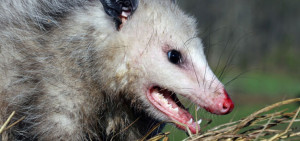 The opossums, also known by their scientific name Didelphimorphia /daɪˌdɛlfɨˈmɔrfiə/), make up the largest order of marsupials in the Western Hemisphere, including 103 or more species in 19 genera. Of South American ancestry, they entered North America following the connection of the two continents. Their unspecialized biology, flexible diet, and reproductive habits make them successful colonizers and survivors in diverse locations and conditions.
The opossums, also known by their scientific name Didelphimorphia /daɪˌdɛlfɨˈmɔrfiə/), make up the largest order of marsupials in the Western Hemisphere, including 103 or more species in 19 genera. Of South American ancestry, they entered North America following the connection of the two continents. Their unspecialized biology, flexible diet, and reproductive habits make them successful colonizers and survivors in diverse locations and conditions.
The word “opossum” is borrowed from the Virginia Algonquian (Powhatan) language, and was first recorded between 1607 and 1611 by the Jamestown colonists John Smith (as “opassom”) and William Strachey (as “aposoum”). The word ultimately derives from the Proto-Algonquian word *wa˙p- aʔθemw, meaning “white dog” or “white beast/animal”.
They are also commonly called possums, particularly in the Southern United States. However, the term “possum” was borrowed into use to describe distantly related Australian marsupials (specifically those of the suborder Phalangeriformes) when Australia became known to Europeans, and is more commonly used for this purpose.